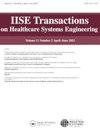Optimizing patient flow, capacity, and performance of COVID-19 vaccination clinics
IF 1.5
Q3 HEALTH CARE SCIENCES & SERVICES
IISE Transactions on Healthcare Systems Engineering
Pub Date : 2022-04-26
DOI:10.1080/24725579.2022.2066740
引用次数: 0
Abstract
Abstract Mass vaccination plays an important role in increasing immunization against COVID-19 and decreasing morbidity. Drive-through and traditional walk-through centers have been set up in most cities in the United States and other countries to vaccinate large numbers of people in a short period of time. This article focuses on a pair of mass vaccination clinics conducted on a mid-sized, public university campus. Applying tools from Industrial Engineering, including time study, flow charts, and Queuing Theory, the team identified improvements that resulted in a 40% reduction in the duration of the second clinic while vaccinating almost the same number of patients with no increases in overall staffing. The work resulted in a model for designing mass vaccination clinics in the future and demonstrates that engineers have the ability to support healthcare personnel to increase the performance of the vaccination centers. The inclusion of engineering in the planning and execution of these vaccination clinics can help maximize clinic capacity, reduce the staff and resources needed, and reduce the patients’ waiting time.优化COVID-19疫苗接种诊所的患者流量、容量和绩效
大规模疫苗接种在提高COVID-19免疫接种和降低发病率方面具有重要作用。在美国和其他国家的大多数城市都建立了免下车和传统的步行中心,以便在短时间内为大量人群接种疫苗。本文关注的是一对在中型公立大学校园内开展的大规模疫苗接种诊所。应用工业工程的工具,包括时间研究、流程图和排队理论,该团队确定了改进措施,使第二家诊所的持续时间减少了40%,同时接种了几乎相同数量的患者,而总体人员配备没有增加。这项工作产生了未来设计大规模疫苗接种诊所的模型,并证明工程师有能力支持医疗保健人员提高疫苗接种中心的绩效。在这些疫苗接种诊所的规划和执行中纳入工程可以帮助最大限度地提高诊所的能力,减少所需的人员和资源,并减少患者的等待时间。
本文章由计算机程序翻译,如有差异,请以英文原文为准。
求助全文
约1分钟内获得全文
求助全文
来源期刊

IISE Transactions on Healthcare Systems Engineering
Social Sciences-Safety Research
CiteScore
3.10
自引率
0.00%
发文量
19
期刊介绍:
IISE Transactions on Healthcare Systems Engineering aims to foster the healthcare systems community by publishing high quality papers that have a strong methodological focus and direct applicability to healthcare systems. Published quarterly, the journal supports research that explores: · Healthcare Operations Management · Medical Decision Making · Socio-Technical Systems Analysis related to healthcare · Quality Engineering · Healthcare Informatics · Healthcare Policy We are looking forward to accepting submissions that document the development and use of industrial and systems engineering tools and techniques including: · Healthcare operations research · Healthcare statistics · Healthcare information systems · Healthcare work measurement · Human factors/ergonomics applied to healthcare systems Research that explores the integration of these tools and techniques with those from other engineering and medical disciplines are also featured. We encourage the submission of clinical notes, or practice notes, to show the impact of contributions that will be published. We also encourage authors to collect an impact statement from their clinical partners to show the impact of research in the clinical practices.
 求助内容:
求助内容: 应助结果提醒方式:
应助结果提醒方式:


